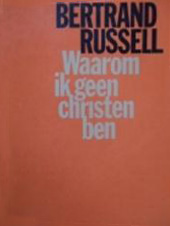Why I Am Not a Christian
Originally a talk given on 6 March 1927 at Battersea Town Hall, under the auspices of the South London Branch of the National Secular Society, it was published that year as a pamphlet and has been republished several times in English and in translation.
Russell opens by defining the term 'Christian', rejecting overly broad definitions in favour of two minimal beliefs: that God exists, and that Christ is a supreme moral role-model.
The moral argument is rejected on the grounds of the Euthyphro dilemma, and a modified version based on the remedying of injustice the non-existence of perfect justice (due to the improbability of an afterlife or similar).
Russell then cites chiefly Christ's frequent invocations of Hell (but also the stories of the Gadarene swine and the fig-tree) as examples of those teachings that suggest imperfection in both kindness and wisdom.
Russell had been denied a professorship in New York for his political and secular views, tolerance for gay and lesbian behaviour, and support of eugenics, particularly directed towards sterilizing "feeble-minded women".
